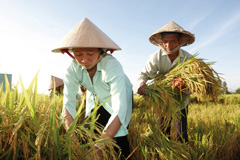 nd Kaiima Bio-Agritech Ltd., Moshav Sharona, Israel, today announced their collaboration to develop advanced hybrid rice varieties. The multi-year project combines Bayer's and Kaiima's expertise in breeding and technology in order to increase growers' productivity in important rice-cultivating countries. The goal of the collaboration is to focus on the breeding of new high-yielding hybrid rice varieties utilizing Bayer's elite rice germplasm and Kaiima's proprietary Enhanced Ploidy (EP™) technology.
nd Kaiima Bio-Agritech Ltd., Moshav Sharona, Israel, today announced their collaboration to develop advanced hybrid rice varieties. The multi-year project combines Bayer's and Kaiima's expertise in breeding and technology in order to increase growers' productivity in important rice-cultivating countries. The goal of the collaboration is to focus on the breeding of new high-yielding hybrid rice varieties utilizing Bayer's elite rice germplasm and Kaiima's proprietary Enhanced Ploidy (EP™) technology.Kaiima has been able to successfully harness the benefits of polyploidy by developing its breakthrough, non-GMO EP™ technology. When applied to high-impact food crops, EP™ significantly boosts plants' productivity. EP™ is based on the genome duplication phenomenon that occurs naturally in plants, and is considered as one of the most important evolutionary processes that plants use to adapt to stressful environmental changes.
"We are always eager to partner with innovative scientists around the world to bring sustainable solutions to our customers," said Dr. Steve Calhoun, International Rice Breeding Manager for Bayer. "We look forward to working with Kaiima to take hybrid rice to the next level."
"There needs to be a collective effort to sustainably address food security," said Dr. Doron Gal, CEO of Kaiima. "We are pleased to partner with Bayer CropScience – a global leader in innovative crop science – to develop a breakthrough in one of the world's most widely cultivated food crops," he added. "By applying our technology to Bayer's elite rice varieties, we can together bring new solutions to farmers that will help improve yield stability and secure productivity today and for years to come."
Bayer CropScience is the global leader in developing and supplying hybrid rice seed. Hybrid rice shows higher grain yields, better stress tolerance, and lower fertilizer requirements versus traditional open-pollinated varieties. In addition, Bayer uses naturally occurring genetic variation to breed into their hybrids additional resistance to important pests such as bacterial leaf blight and brown plant hopper, as well as tolerance to abiotic stresses such as salinity and excessive flooding.





